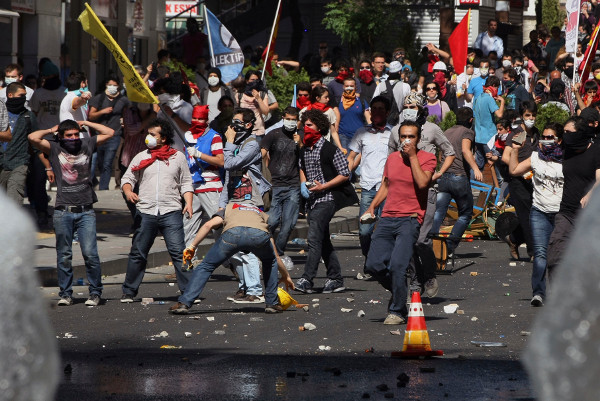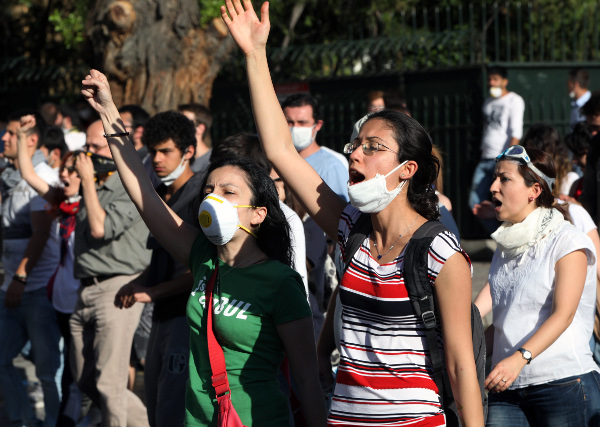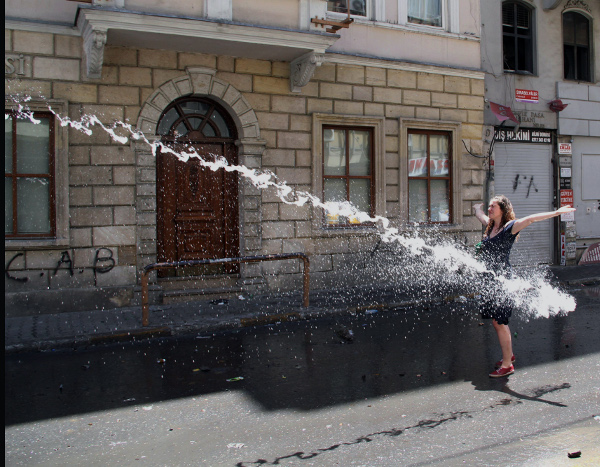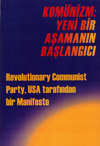Turkey: A bright carnival in the shadow of a revengeful state
June 16, 2013 | Revolution Newspaper | revcom.us
Editor's note: The following is drawn from new coverage including the article "Turkey: A bright carnival in the shadow of a revengeful state" distributed by A World To Win News Service.
A World to Win News Service is put out by A World to Win magazine, a political and theoretical review inspired by the formation of the Revolutionary Internationalist Movement, the embryonic center of the world's Marxist-Leninist-Maoist parties and organizations.

Thousands of youth clash with security forces in Ankara on June 1.
Photo: AP
1) "It started out about a park, but now it's about everything," someone tweeted in the middle of the night as protesters fought police in Istanbul's Taksim Square. As we go to press, massive protests are raging throughout the country of Turkey. The events began on Tuesday morning, May 28, when some 50 protesters stood in front of the bulldozers about to attack the trees in Gezi Park, adjacent to Taksim Square.
Taksim Square is a major gathering place, hangout, and location for political and cultural activities. Turkey's Prime Minister Recep Tayyip Erdogan had announced that much of the square would be leveled and replaced with a bizarre replica of a military barracks serving the oppressive Ottoman Empire that once stood on this site, along with a shopping center, condominiums, and a new mosque. Erdogan's role has been to shore up the Turkish ruling class power structure in large part through Islamicization of society, including imposing religion and tightening the oppression of women. In the days following the initial protest, the park was occupied around the clock by youth in affinity with the global Occupy movement and others determined to save one of the city's last green spaces.

Youth chant "Tayyip, resign!" in Ankara on June 1.
Photo: AP
2) At 5 am on Friday May 31, police attacked. They fired rounds of tear gas into tents with people sleeping in them, including children; they sent in bulldozers to roll over everything and set fire to the encampment. Hundreds of protesters, journalists, and passersby were injured. An attempted sit-in was dispersed. Instead of putting an end to the protests, this assault made many thousands of people from all walks of life feel that they had to come to the rescue. Some people chanted, "Thanks, Tayyip, for the wake-up call."
News coverage described youth throwing stones and other objects, fighting back against police in pitched battles that lasted all day and all night. The next day, the police withdrew from the square and protesters closed off the entrances with high barricades built of cobblestones and appropriated police crowd-control barriers, street signs and other items.
The protesters are high school and university students and teachers (the universities suspended final exams); artists, architects, city planners, and other intellectuals (some of the very first demonstrators); doctors and lawyers (their associations defended the protesters, and many came to help them); slum youth and their parents, many of Kurdish origin (Kurdish people are an oppressed nationality within Turkey and in other countries in the region); white collar workers and business people; shopkeepers (often handing out lemons and milk to sooth eyes burned by tear gas and pepper gas); pushcart peddlers; and housewives of all backgrounds, including traditional peasant families, some covered, most not. A few days later the two public service union confederations called a two-day strike and their members joined the youth.
3) In response to the protests, a government spokesman said, "It doesn't matter what you do. We made a decision and we will follow through with that decision." A bridge that is part of the project, he announced, would be named Yavez (the Great) Sultan Selim, after the 16th-century hereditary ruler who made the Ottoman Empire a caliphate (Islamic state), also infamous for the slaughter of members of the Alevi religious minority. And the regime has continued to use violence to attempt to suppress the uprising.

The police, who were spraying people in the face with streams of pepper gas
and firing bone-breaking, flesh-penetrating baton rounds at close range,
displayed a particularly violent hatred for women. Photos on the web show
one or another defiant woman caught in a crossfire of gas-loaded water
cannons strong enough to cause serious injury. Above, a woman defies police
water cannons in Istanbul on June 1.
Photo: AP
4) In the clashes with the police, in the assaults and counter-assaults, countless women were in the forefront of the fighting, relishing a chance to battle for what they see as a clash over what kind of world they will live in. There were women in sun dresses holding out their arms to mockingly gesture "bring it on" to the riot police; women in thin tank tops, their hands wrapped in rags so that they could grab tear gas canisters; many young students in jeans, some wearing head-scarves and a few with Occupy face masks as well; and other women of all ages and classes.
The police, who were spraying people in the face with streams of pepper gas and firing bone-breaking, flesh-penetrating baton rounds at close range, displayed a particularly violent hatred for women.
Few women entered into this fray without an awareness of the special dangers, but perhaps their enthusiasm for symbolic and physical confrontation stems from a feeling that they are a central target of Erdogan's reactionary Islamic program. He tried to ban caesarean section births and put restrictions on abortion, not so much in the name of religion but because, as he once opined on TV, "Turkish women" (meaning ethnic Turks, not the country's minorities) should have more babies. In the blatantly patriarchal climate Erdogan has helped foster, honor killings, long a plague in Turkey, have risen sharply, with little prosecution. This participation by women is not just an interesting and positive feature. It is one of the best characteristics of this movement.
COMMUNISM: THE BEGINNING OF A NEW STAGE
A Manifesto from the Revolutionary Communist Party, USA
 Available in English, Spanish, Turkish, Farsi, and German from RCP Publications, P.O. Box 3486, Merchandise Mart, Chicago, IL 60654. $5 + $1 shipping. A draft translation into Arabic is now available in Arabic online at revcom.us.
Available in English, Spanish, Turkish, Farsi, and German from RCP Publications, P.O. Box 3486, Merchandise Mart, Chicago, IL 60654. $5 + $1 shipping. A draft translation into Arabic is now available in Arabic online at revcom.us.
We envision a movement of people working to produce high-quality accurate translations in many languages which can then be distributed around the world on the Internet and in print. We invite your comments. Send them to RCP Publications, Box 3486, Merchandise Mart, Chicago, IL 60654 or rcppubs@hotmail.com
5) Less than three weeks before the protests, Barack Obama had Erdogan visit the White House and praised the U.S.'s "partnership" with his regime. With the outbreak of the protests, a White House spokesman issued a hypocritical statement claiming to support "full freedom of expression and assembly" in Turkey. But for many decades the U.S. has been the main imperialist overlord of Turkey and has propped up a succession of brutal, reactionary regimes that massacred opponents, oppressed nationalities, and revolutionaries. The ruling class of Turkey plays an important role policing the region on behalf of U.S. imperialism—including right now serving as a key conduit for U.S. intervention in Syria. The inspiring protests are rocking a country that, especially in recent years, U.S. imperialism has seen as a relatively reliable and stable ally and enforcer for its interests in Central Asia and the Middle East.
People in the U.S. have a particular responsibility to support the uprising in Turkey, and oppose repression against the protesters, as well as moves by the rulers of the U.S. to tighten their domination of the country and advance their interests in the midst of the uprising in Turkey.
If you like this article, subscribe, donate to and sustain Revolution newspaper.
